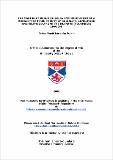Files in this item
The making of real people : an interpretation of a morality-centred theory of sociality, livelihood and selfhood among the Muinane (Colombian Amazon)
Item metadata
| dc.contributor.advisor | Overing, Joanna | |
| dc.contributor.author | Londoño Sulkin, Carlos David | |
| dc.coverage.spatial | 442 | en_US |
| dc.date.accessioned | 2010-09-21T13:57:06Z | |
| dc.date.available | 2010-09-21T13:57:06Z | |
| dc.date.issued | 2000 | |
| dc.identifier.uri | https://hdl.handle.net/10023/1010 | |
| dc.description.abstract | In this monograph I interpret a wide-ranging native theory of sociality of the Muinane, an indigenous group of the Colombian Amazon. This theory simultaneously addresses their livelihood activities, some aspects of their phenomenological experience, their bodily form, their group identity, and their views on the achievement of a uniquely human, morally sociable way of life. The Muinane understand their thoughts/emotions as well as their bodies to be material in origin and character. Proper bodies and thoughts/emotions are made out of ritual substances and foodstuffs, which have divine subjectivities and agencies of their own, and which ‘sound’ through people, establishing people's subjectivities and agencies. Such subjectivities and agencies lead to the communal achievement of `coolness', the state of convivial sociability, tranquility, abundance and generalised good health that constitutes ideal community life. Because they share substances, kin are also understood to share bodily features and thoughts/emotions. Their consubstantiality leads to mutual love and to an intersubjectivity that enables them to live well together, without unseemly contestations or differences in ultimate moral purposes. However, the material character of bodies and thoughts/emotions is also a source of danger. Animals and other evil beings can sabotage proper community life by replacing people's moral substances with their own false ones, causing people to experience mad, envious, angry and even sorcerous thoughts/emotions, and to suffer from weakening or lethal bodily diseases. It is the moral obligation and inclination of properly constituted human beings to make new human beings, by intentionally forging their bodies, their thoughts/emotions and their ‘baskets of knowledge.’ They must do this by transforming evil substances into proper substances, through work and through everyday or sporadic rituals. The matters addressed in this monograph -native theories of sociality, of self, of livelihood and so on- are of central pertinence to ongoing discussions in Amazonianist anthropology. | en_US |
| dc.language.iso | en | en_US |
| dc.title | The making of real people : an interpretation of a morality-centred theory of sociality, livelihood and selfhood among the Muinane (Colombian Amazon) | en_US |
| dc.type | Thesis | en_US |
| dc.type.qualificationlevel | Doctoral | en_US |
| dc.type.qualificationname | PhD Doctor of Philosophy | en_US |
| dc.publisher.institution | The University of St Andrews | en_US |
This item appears in the following Collection(s)
Items in the St Andrews Research Repository are protected by copyright, with all rights reserved, unless otherwise indicated.

